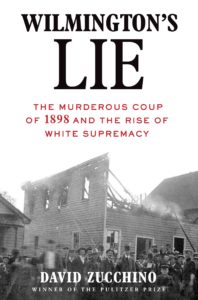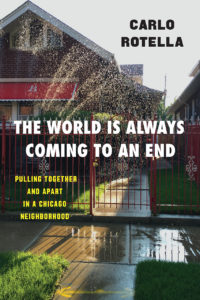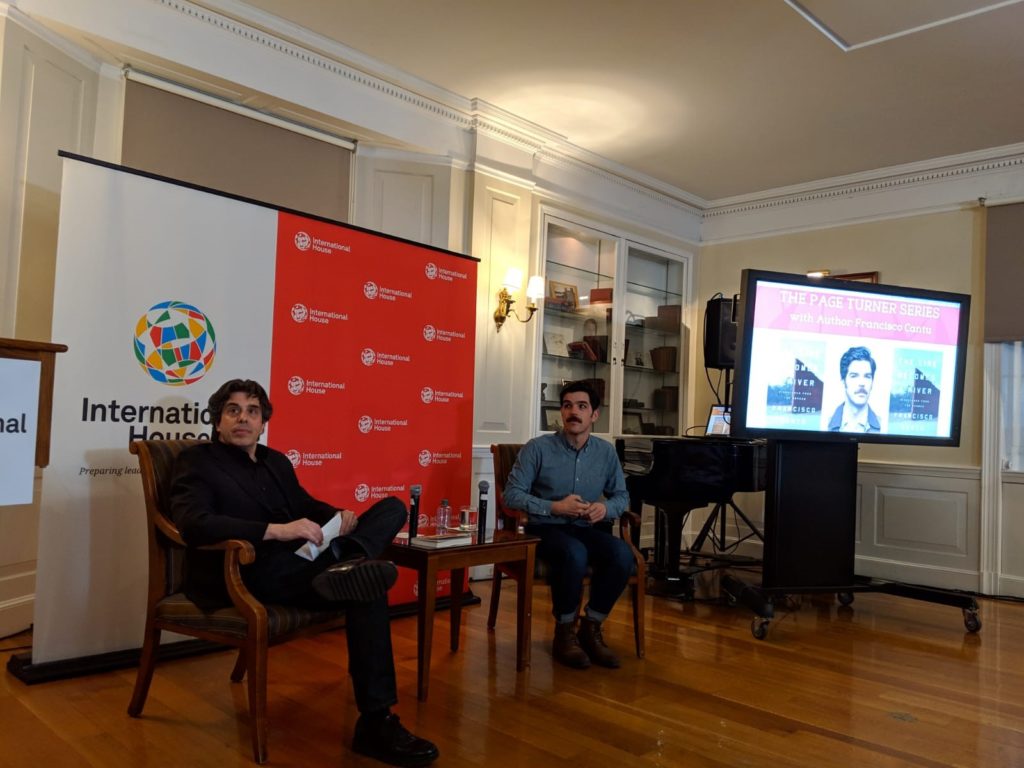Uncategorized
In These Times…
We hunker down and hope and wait. And worry about our loved ones. I’m working hard as usual on the journalism and fiction fronts. The response to this catastrophe (for once that word is not hyperbole) has to be creativity, solidarity and, to the extent possible, good cheer. All of which are summed up admirably by the work of my new musical heroes: Stay Homas. I like them partly because they are from Barcelona, one of my ancestral hometowns. But mostly because they’re so good! Check them out and make the most of El Confineo…
Zucchino’s Truth

I recently had the pleasure of attending a book presentation by David Zucchino, my friend and former L.A. Times colleague. Dave is one the finest journalists I know: a courageous reporter who can talk to just about anybody, a gifted writer who makes even the most prosaic feature sing, and a generous, warm, old-school gentleman. His new book is Wilmington’s Lie: The Murderous Coup of 1898 and the Rise of White Supremacy. It recounts a fascinating and little-known tale about a massacre in North Carolina. The acclaim has come pouring in from the New York Times Sunday Book Review and many others. You can read more about him and the book here. In his previous books, Myth of the Welfare Queen and Thunder Run, Dave showed his intrepid ability to explore harsh terrain, whether inner-city Philadelphia or the battlefields of Iraq, find compelling characters, and tell their stories. In Wilmington’s Lie, he turns his talents to history. The result is an important and powerful work. I recommend it highly.
New York Times magazine article
It’s not a book, but it took months of hard work. In partnership with ProPublica, the New York Times magazine published today The Saudi Connection, a piece with my esteemed colleague Tim Golden about the secret history of the 9/11 investigation.
Current Events
Happy New Year, readers and friends. Between journalism by day and fiction-writing by night, I haven’t had much time for posts recently. I hope to pick up the pace in 2020. For the moment, I thought I would venture into the zone where fact and fiction converge (one of my favorite zones). I’d like to share two items that come to mind because of recent events related to Iraq and Iran.
The first is an article I wrote in 2012 about Iranian intelligence and terror networks around the world, and the nature and nuances of the threat they pose. I thought it might offer some useful context and background as we enter a period of geopolitical tension and uncertainty.
The second is an excerpt from my novel The Convert’s Song. (For those who haven’t read the novel: spoiler alert!) The Convert’s Song was published in 2014. I think it’s fair to say there’s some resonance with the remarkable story of the death last week of General Soleimani of the Iranian Quds Force…
“Pescatore had spent hours reading and listening to briefings about the brigadier. The combined might of several spy agencies had produced few pictures. None was more recent than the photo in Bolivia six years before. Ali was fifty-three now. His shoulders and neck were meaty and powerful in a collarless shirt of gray silk. He had a slight and solid belly. His short, well-groomed beard had acquired tinges of gray. His hairline had receded farther, a narrow rampart cresting above the middle of his forehead. He had thin hard lips bracketed by indented lines descending from his nostrils. He wore a designer watch. When he stared intently, he lowered his narrow chin, raised his eyes, and tilted his head—the coiled pose of a world-class chess grand master who played on a board piled with corpses and cash. A high-rolling gangster general.”
…
The three of them sat down at a table. There were plastic cups and a large bottle of water. Pescatore drank like a man who had been crawling through the desert. They were sitting and drinking in silence when they heard an explosion in the distance. They felt it too: a low resounding thump.
Pescatore closed his eyes.
“Hel-lo,” Malone said.
“Hello, Hellfire,” Stockton said.
Pescatore opened his eyes. Malone and Stockton bumped fists. Malone extended his arm across the table. Mechanically, Pescatore bumped the big fist.
On the edge of the city, a plume of smoke rose toward the sun.
The planners had counted on the fact that the Quds Force simply did not believe the U.S. government would do a drone strike in Baghdad. Too politically delicate, too diplomatically volatile. Although the Iranians were correct in theory, Brigadier Ali was a special case. He had crossed too many red lines. Washington had decided to send a message. If the Iraqis and the Iranians didn’t like it, tough shit.”
Once more, in Italian
Camilleri Vive
I had the opportunity to interview Andrea Camilleri, the maestro of Italian crime fiction, in Rome in 2009. He was relaxed, funny, gentlemanly and thoroughly content with his existence as one of the most popular authors in Italy, Europe and the world. It was one of the most memorable and enjoyable interviews I’ve ever done. Today, Camilleri passed away at 93. But what a life, what a body of work, what a loveable and immortal character. Here’s the story I wrote back then.
Rip Crew in French…encore
It’s once again a pleasure to work with the 10-18 publishing house in France. They just published the paperback (poche) version of Rip Crew: Trafiquants & Associés. And they put together a nice video for the launch. Merci beaucoup et bonne lecture…
Origin Stories
 In at least one respect, I am like Sherlock Holmes: I have a smarter brother. In fact, I have two smarter brothers: Carlo and Sal. Carlo’s new book just came out to great acclaim. It is called The World is Always Coming to an End: Pulling Together and Apart in a Chicago Neighborhood. Mixing memoir, history, sociology and rigorous reporting, he tells the story of South Shore, the neighborhood in Chicago where we grew up. The result (according to many people who are not the author’s brother) is a masterpiece about the American city. If you read it, you will learn about race and class, bungalows and mansions, Raymond Chandler and Conan the Barbarian, crime and punishment, guns and music. You will meet an unforgettable gallery of characters: gunslingers, politicians, do-gooders, scoundrels, intellectuals, cowards, visionaries and decent hard-working Americans trying to get by in a harsh landscape being transformed by forces far beyond their control. (My favorites are probably a duo of ex-cops who deserve their own TV show: Hamilton and Daveed.) You will discover Carlo’s masterful voice, which combines highbrow intellect, streetwise journalism, virtuoso prose and, above all, a vivid and unique sense of humor. My career has taken me around the world but, as it is for my brothers, South Shore remains the place that prepared me for the world and shaped me as a person and a writer. My small contribution to the book is the epigraph. It comes from an interview I did for the Los Angeles Times with the Sicilian author Andrea Camilleri, a cheerful sage who said: “Tell the story of your village. If you tell it well, you will have told the story of the world.” This book achieves that daunting literary mission.
In at least one respect, I am like Sherlock Holmes: I have a smarter brother. In fact, I have two smarter brothers: Carlo and Sal. Carlo’s new book just came out to great acclaim. It is called The World is Always Coming to an End: Pulling Together and Apart in a Chicago Neighborhood. Mixing memoir, history, sociology and rigorous reporting, he tells the story of South Shore, the neighborhood in Chicago where we grew up. The result (according to many people who are not the author’s brother) is a masterpiece about the American city. If you read it, you will learn about race and class, bungalows and mansions, Raymond Chandler and Conan the Barbarian, crime and punishment, guns and music. You will meet an unforgettable gallery of characters: gunslingers, politicians, do-gooders, scoundrels, intellectuals, cowards, visionaries and decent hard-working Americans trying to get by in a harsh landscape being transformed by forces far beyond their control. (My favorites are probably a duo of ex-cops who deserve their own TV show: Hamilton and Daveed.) You will discover Carlo’s masterful voice, which combines highbrow intellect, streetwise journalism, virtuoso prose and, above all, a vivid and unique sense of humor. My career has taken me around the world but, as it is for my brothers, South Shore remains the place that prepared me for the world and shaped me as a person and a writer. My small contribution to the book is the epigraph. It comes from an interview I did for the Los Angeles Times with the Sicilian author Andrea Camilleri, a cheerful sage who said: “Tell the story of your village. If you tell it well, you will have told the story of the world.” This book achieves that daunting literary mission.
Of Lines and Rivers
 A few days ago, I had the pleasure of moderating a discussion with Francisco Cantú, the author of The Line Becomes a River, at International House in New York. Francisco served in the Border Patrol from 2008 to 2012. His book is a memoir about that experience: his internal conflicts, his gradual disillusionment and despair, his education about the plight of illegal immigrants. I have spent a lot of time with Border Patrol agents, riding and drinking and talking with them, listening to and telling their stories. I have written about the dark and heroic aspects of their world in both journalism and fiction. So I read his book–a rare inside account of an insular and wary institution–with great expectation. I was really impressed. And despite all the years I’ve spent covering the border, the book also surprised me. It was more poetic and introspective than I had expected, interweaving the somewhat predictable but always fascinating and poignant war stories with other narrative strands: dreams, historical and literary texts, the voices of the agents and, above all, the migrants who are often voiceless. It was not a surprise to discover that Francisco is a thoughtful, restrained and committed guy who is still working to explore and describe the tragic and complex realities of the borderlands. The paperback version of The Line Becomes a River was just published with an afterword that addresses today’s political uproar about border issues. (Although the current presidential administration had taken office while the hardcover was being edited, Francisco told me he decided not to insert material about the politics of the moment in that version because he wanted to focus on deeper, enduring, transcendent issues. I think that was a great choice.) Bottom line: I don’t agree with everything in this book, but it is a true literary achievement by a talented and promising author. I really enjoyed reading it and getting to know him, and I think you will too.
A few days ago, I had the pleasure of moderating a discussion with Francisco Cantú, the author of The Line Becomes a River, at International House in New York. Francisco served in the Border Patrol from 2008 to 2012. His book is a memoir about that experience: his internal conflicts, his gradual disillusionment and despair, his education about the plight of illegal immigrants. I have spent a lot of time with Border Patrol agents, riding and drinking and talking with them, listening to and telling their stories. I have written about the dark and heroic aspects of their world in both journalism and fiction. So I read his book–a rare inside account of an insular and wary institution–with great expectation. I was really impressed. And despite all the years I’ve spent covering the border, the book also surprised me. It was more poetic and introspective than I had expected, interweaving the somewhat predictable but always fascinating and poignant war stories with other narrative strands: dreams, historical and literary texts, the voices of the agents and, above all, the migrants who are often voiceless. It was not a surprise to discover that Francisco is a thoughtful, restrained and committed guy who is still working to explore and describe the tragic and complex realities of the borderlands. The paperback version of The Line Becomes a River was just published with an afterword that addresses today’s political uproar about border issues. (Although the current presidential administration had taken office while the hardcover was being edited, Francisco told me he decided not to insert material about the politics of the moment in that version because he wanted to focus on deeper, enduring, transcendent issues. I think that was a great choice.) Bottom line: I don’t agree with everything in this book, but it is a true literary achievement by a talented and promising author. I really enjoyed reading it and getting to know him, and I think you will too.
A Worthy Cause
The Committee to Protect Journalists has launched The Last Column, a memorial initiative to celebrate the 1,337 journalists who have been killed in the line of duty since 1992. I had the privilege of meeting some of them, including Javier Valdez Cardenas and Marie Colvin. And I have met and worked with many others around the world, from Baghdad to Buenos Aires to Tijuana, who risk their lives on a daily basis against dangerous and powerful forces. As part of the initiative, the CPJ has published a book. We should honor their memory.